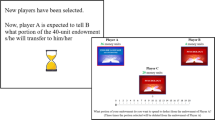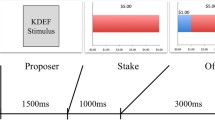Abstract
People’s beliefs and behaviors are influenced by the preferences and behaviors of those around them. This effect is known as “social influence.” Previous studies have found that ingroup favoritism can modulate the effect of social influence on individuals’ attitudes and behaviors. In this study, we investigated the interaction of ingroup favoritism and social influence on punishment decisions in unfair situations. In experiment 1, the ultimatum game was used to assess participant’ response to unfairness directed toward oneself in in-group and out-group social influence contexts. In experiment 2, we used a third-party dictator game to examine how ingroup favoritism modulates the effect of social influence on participants’ responses to unfairness toward others. The interaction effect demonstrated that ingroup favoritism was particularly pronounced when the social influence suggested punishment, and absent when social influence suggested no punishment. Conversely, no such interaction was found in the ultimatum game. Our findings suggest that people draw psychologically relevant distinctions between unfairness toward themselves and unfairness toward others.



Similar content being viewed by others
Data Availability
The datasets analyzed during the current study are available in the Zenodo repository, [https://doi.org/10.5281/zenodo.5712011].
Code Availability
Not applicable.
Research ethics approval was obtained from the Southwestern University of Finance and Economics and is in accordance with the Declaration of Helsinki. Consent to Participate Informed consent was obtained from all participants included in the study.
References
Alvaro, E. M., & Crano, W. D. (1997). Indirect Minority Influence: Evidence for Leniency in Source Evaluation and Counter argumentation. Journal of Personality and Social Psychology, 72(5), 949–964.
Balliet, D., Wu, J., & De Dreu, C. K. (2014). Ingroup favoritism in cooperation: A meta-analysis. Psychological Bulletin, 140(6), 1556–1581.
Bellucci, G., Camilleri, J. A., Iyengar, V., Eickhoff, S. B., & Krueger, F. (2020). The emerging neuroscience of social punishment: Meta-analytic evidence. Neuroscience & Biobehavioral Reviews, 113, 426–439.
Bernhard, H., Fehr, E., & Fischbacher, U. (2006). Group affiliation and altruistic norm enforcement. American Economic Review, 96(2), 217–221.
Bettencourt, B. A., Charlton, K., & Kernahan, C. (1997). Numerical representation of groups in cooperative settings: Social orientation effects on ingroup bias. Journal of Experimental Social Psychology, 33(6), 630–659.
Bolton, G. E., & Zwick, R. (1995). Anonymity versus punishment in ultimatum bargaining. Games and Economic Behavior, 10(1), 95–121.
Brewer, M. B. (1979). In-group bias in the minimal intergroup situation: A cognitive-motivational analysis. Psychological Bulletin, 86(2), 307–324.
Camerer, C. F., & Thaler, R. H. (1995). Anomalies: Ultimatums, dictators and manners. Journal of Economic Perspectives, 9(2), 209–219.
Cassidy, K. D., Quinn, K. A., & Humphreys, G. W. (2011). The influence of ingroup/outgroup categorization on same-and other-race face processing: The moderating role of inter-versus intra-racial context. Journal of Experimental Social Psychology, 47(4), 811–817.
Castano, E., Yzerbyt, V., Paladino, M. P., & Sacchi, S. (2002). I belong, therefore, I exist: Ingroup identification, ingroup entitativity, and ingroup bias. Personality and Social Psychology Bulletin, 28(2), 135–143.
Cialdini, R. B., & Goldstein, N. J. (2004). Social Influence: Compliance and Conformity. Annual Review of Psychology, 55, 591–621.
Fabbri, M., & Carbonara, E. (2017). Social influence on third-party punishment: An experiment. Journal of Economic Psychology, 62, 204–230.
Faul, F., Erdfelder, E., Lang, A., & Buchner, A. (2007). G*Power 3: A flexible statistical power analysis program for the social, behavioral, and biomedical sciences. Behavior Research Methods, 39(2), 175–191.
Fehr, E., & Fischbacher, U. (2003). The nature of human altruism. Nature, 425, 785–791.
Feng, C., Yang, Q., Azem, L., Atanasova, K. M., Gu, R., Luo, W., ... & Krueger, F. (2021). An fMRI investigation of the intention-outcome interactions in second-and third-party punishment. Brain Imaging and Behavior, 1–13.
Gonzalez, G., Blake, P. R., Dunham, Y., & McAuliffe, K. (2020). Ingroup Bias Does Not Influence Inequity Aversion in Children. Developmental Psychology, 56(6), 1080–1091.
Güth, W., Schmittberger, R., & Schwarze, B. (1982). An experimental analysis of ultimatum bargaining. Journal of Economic Behavior & Organization, 3(4), 367–388.
Hehman, E., Mania, E. W., & Gaertner, S. L. (2010). Where the division lies: Common ingroup identity moderates the cross-race facial-recognition effect. Journal of Experimental Social Psychology, 46(2), 445–448.
Henrich, J., & Boyd, R. (2001). Why people punish defectors: Weak conformist transmission can stabilize costly enforcement of norms in cooperative dilemmas. Journal of Theoretical Biology, 208(1), 79–89.
Jensen, K. (2010). Punishment and spite, the dark side of cooperation. Philosophical Transactions of the Royal Society b: Biological Sciences, 365(1553), 2635–2650.
Karasawa, M. (1988). Effects of cohesiveness and inferiority upon ingroup favoritism. Japanese Psychological Research, 30(2), 49–59.
Kelman, H. C. (1958). Compliance, identification, and internalization three processes of attitude change. Journal of Conflict Resolution, 2(1), 51–60.
Kurzban, R., DeScioli, P., & O’Brien, E. (2007). Audience effects on moralistic punishment. Evolution and Human Behavior, 28, 75–84.
Leibbrandt, A., & López-Pérez, R. (2012). An exploration of third and second party punishment in ten simple games. Journal of Economic Behavior & Organization, 84(3), 753–766.
Leonardelli, G. J., & Brewer, M. B. (2001). Minority and majority discrimination: When and why. Journal of Experimental Social Psychology, 37, 468–485.
Lin, L. C., Qu, Y., & Telzer, E. H. (2018). Intergroup social influence on emotion processing in the brain. Proceedings of the National Academy of Sciences, 115(42), 10630–10635.
Lois, G., & Wessa, M. (2019). Creating sanctioning norms in the lab: The influence of descriptive norms in third-party punishment. Social Influence, 14(2), 50–63.
Mackie, D. M., Worth, L. T., & Asuncion, A. G. (1990). Processing of Persuasive In-Group Messages. Journal of Personality and Social Psychology, 58(5), 812–822.
Mackie, D. M., Gastardo-Conaco, M. C., & Skelly, J. J. (1992). Knowledge of the advocated position and the processing of in-group and out-group persuasive messages. Personality and Social Psychology Bulletin, 18(2), 145–151.
Marlowe, F. W., Berbesque, J. C., Barr, A., Barrett, C., Bolyanatz, A., Cardenas, J. C., ... & Tracer, D. (2008). More ‘altruistic’ punishment in larger societies. Proceedings of the Royal Society B: Biological Sciences, 275(1634), 587–592.
McDonald, R. I., & Crandall, C. S. (2015). Social norms and social influence. Current Opinion in Behavioral Sciences, 3, 147–151.
Morgan, T. J. H., & Laland, K. N. (2012). The biological bases of conformity. Frontiers in Neuroscience, 6, 87.
Mullen, B., Brown, R., & Smith, C. (1992). Ingroup bias as a function of salience, relevance, and status: An integration. European Journal of Social Psychology, 22(2), 103–122.
Nowak, M. A., Page, K. M., & Sigmund, K. (2000). Fairness versus reason in the ultimatum game. Science, 289(5485), 1773–1775.
Oosterbeek, H., Sloof, R., & Van De Kuilen, G. (2004). Cultural differences in ultimatum game experiments: Evidence from a meta-analysis. Experimental Economics, 7(2), 171–188.
Perdue, C. W., Dovidio, J. F., Gurtman, M. B., & Tyler, R. B. (1990). Us and them: Social categorization and the process of intergroup bias. Journal of Personality and Social Psychology, 59(3), 475–486.
Riedl, K., Jensen, K., Call, J., & Tomasello, M. (2012). No third-party punishment in chimpanzees. Proceedings of the National Academy of Sciences, 109(37), 14824–14829.
Salali, G. D., Juda, M., & Henrich, J. (2015). Transmission and development of costly punishment in children. Evolution and Human Behavior, 36(2), 86–94.
Smith, J. R., & Louis, W. R. (2009). Group norms and the attitude–behaviour relationship. Social and Personality Psychology Compass, 3(1), 19–35.
Stallen, M., Smidts, A., & Sanfey, A. (2013). Peer influence: Neural mechanisms underlying in-group conformity. Frontiers in Human Neuroscience, 7, 50.
Tajfel, H., & Turner, J. C. (1986). The social identity theory of intergroup behavior. In S. Worchel. & W. Austin (Eds), Psychology of Intergroup Relations. Chicago, Nelson-Hall.
Tarrant, M., Dazeley, S., & Cottom, T. (2009). Social categorization and empathy for outgroup members. British Journal of Social Psychology, 48(3), 427–446.
Toelch, U., & Dolan, R. J. (2015). Informational and normative influences in conformity from a neurocomputational perspective. Trends in Cognitive Sciences, 19(10), 579–589.
Turner, J. C., Wetherell, M. S., & Hogg, M. A. (1989). Referent informational influence and group polarization. British Journal of Social Psychology, 28(2), 135–147.
Voci, A. (2006). The link between identification and in-group favouritism: Effects of threat to social identity and trust-related emotions. British Journal of Social Psychology, 45(2), 265–284.
Wei, Z., Zhao, Z., & Zheng, Y. (2013). Neural mechanisms underlying social conformity in an ultimatum game. Frontiers in Human Neuroscience, 7, 896.
Yamagishi, T., & Mifune, N. (2008). Does shared group membership promote altruism? Fear, greed, and reputation. Rationality and Society, 20(1), 5–30.
Zheng, X., & Segalowitz, S. J. (2014). Putting a face in its place: In-and out-group membership alters the N170 response. Social Cognitive and Affective Neuroscience, 9(7), 961–968.
Zhou, Y., Jiao, P., & Zhang, Q. (2017). Second-party and third-party punishment in a public goods experiment. Applied Economics Letters, 24, 54–57.
Acknowledgements
The authors thank the reviewers for their constructive comments that improved the manuscript considerably.
Funding
This study was supported by grants from the Humanities and Social Sciences Research Projects of the Ministry of Education (grant numbers 21YJC840026), the National Social Science Foundation of China (grant numbers 19CSH053) and the Fundamental Research Funds for the Central Universities (grant numbers JBK2102028) in China.
Author information
Authors and Affiliations
Contributions
Conceived and designed the experiments: ZW. Program the task: ZW. Performed the.
experiments: XL and SD. Analyzed the data: ZW. Wrote the paper: ZW and YD.
Corresponding author
Ethics declarations
Consent for Publication
Not applicable.
Conflict of Interest
The authors declare that the research was conducted in the absence of any commercial or financial relationships that could be construed as a potential conflict of interest.
Additional information
Publisher's Note
Springer Nature remains neutral with regard to jurisdictional claims in published maps and institutional affiliations.
Rights and permissions
About this article
Cite this article
Wei, Z., Ding, Y., Liu, X. et al. In-group and out-group social influence on punishment in unfair situations. Curr Psychol 42, 18396–18404 (2023). https://doi.org/10.1007/s12144-022-03027-9
Accepted:
Published:
Issue Date:
DOI: https://doi.org/10.1007/s12144-022-03027-9




